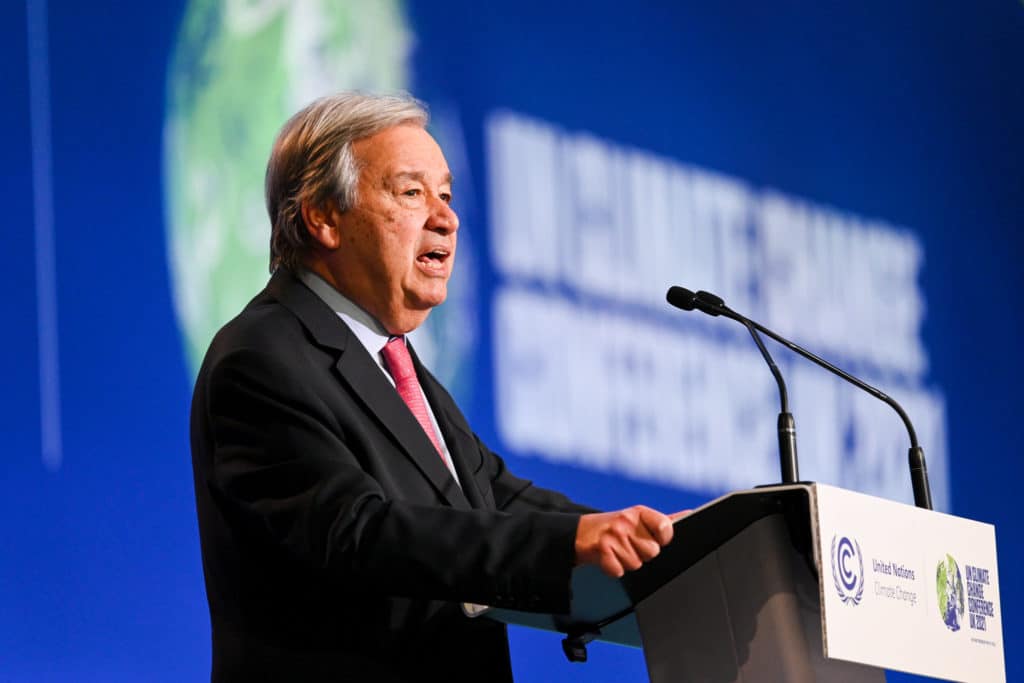Following a disappointing end to the critical climate summit in Bonn last week, UN head António Guterres said the fossil fuel industry is “at the heart of the climate crisis” and urged countries to boost investments in renewables.
—
United Nations Secretary-General António Guterres launched a tirade against the fossil fuel industry over its role in climate change last week, describing Big Oil companies’ actions as “immoral” and calling on countries to develop a credible phase-out strategy.
“The problem is not simply fossil fuel emissions. It’s fossil fuels – period,” Guterres said in his speech, adding that they are “incompatible with human survival.”
The UN head also attacked carbon capture technology, defined by the Intergovernmental Panel on Climate Change (IPCC) as “anthropogenic activities that remove carbon dioxide from the atmosphere and store it durably in geological, terrestrial, or ocean reservoirs, or in products.” Guterres said that any attempt to justify the fossil fuel expansion with carbon capture and storage technologies only makes companies “more efficient planet wreckers.”
The only feasible solution, he argues, is to phase out fossil fuels completely and instead reinvest the industry’s massive profits in renewables and the green economy.
While clean energy sources are being developed at record speed and are set to cover most of the new global electricity demand by 2025, as a report by the International Energy Agency (IEA) published earlier this year showed, fossil fuel consumption keeps soaring. According to the National Oceanic and Atmospheric Administration (NOAA), CO2 levels peaked at 424 parts per million (ppm) in May and are now more than double what they were before the onset of the Industrial Revolution in the 19th century.
I urge all financial institutions to present public, credible & detailed plans to transition their funding from fossil fuels to clean energy.
To those institutions already doing this shift I say:
Do not relent in the face of attacks on progress.
You are doing the right thing.
— António Guterres (@antonioguterres) June 17, 2023
The speech came on the last day of a key climate summit that takes place every year in Bonn, Germany, ahead of UN Conference of the Parties (COP) meetings. Negotiators walked away from the ten-day conference feeling disappointed and frustrated at the weak outcome. They were tasked with developing an agenda for the upcoming COP28, which will take place in November in the United Arab Emirates (UAE).
Among the topics discussed were a plan to accelerate emissions reductions in the upcoming summit’s agenda and a clear message from this year’s hosting nation. At last year’s COP27 in Glasgow, the UAE – an oil-rich country – reiterated that oil and gas are key to a smooth energy transition and assured that it will keep providing fossil fuels to countries around the world “for as long as the world needs it.”
Another major stumbling block among Bonn negotiators was the appointment of Sultan Al-Jaber, the head of state oil giant Abu Dhabi National Oil Company (ADNOC), as COP28 president – a decision that has been controversial from the start.
Last month, Al-Jaber emphasised the need to phase out fossil fuel emissions, rather than production, by focussing on the development of new emission reduction technologies – a statement effectively leaves the door open for the continued production and use of fossil fuels. In his opening speech in Bonn, however, he said that “the phase-down of fossil fuels is inevitable”.
Despite the promising message, world leaders and climate advocates remain highly concerned about the negative influence he might have on negotiations in November, given his strong ties to the oil industry. Last month, 133 MEPs, senators, and representatives from the United States and the European Union appealed to the heads of their countries and the United Nations to take a step back on Al-Jaber’s appointment.
You might also like: World ‘More Likely Than Not’ to Breach 1.5C Temperature Limit by 2027, UN Warns


















